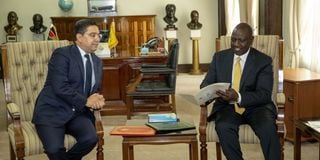Premium
How Ruto fertiliser plan forces him to appease Morocco

President William Ruto with Morrocan Foreign Minister Nasser Bourita at State House Nairobi on September 14, 2022. The meeting resulted into a diplomatic gaffe. PHOTO | PSCU
What you need to know:
- Morocco is the biggest producer of fertiliser on the continent.
- It is no secret that the first 1.4 million bags of fertiliser will come from Morocco, with the new regime seeking to make longer-term arrangements in that area
- Behind the scenes, talks on fertiliser trade, cost, import and investment are ongoing between the two nations.
On his first full day in office, President William Ruto said that Kenya’s relations with the Kingdom of Morocco would be “speeded up in areas of trade, agriculture, health, tourism, energy, among others, for the mutual benefit of our countries.”
A day earlier, in his inauguration speech, the President had made a public pledge to lower fertiliser prices from the current Sh6,500 to Sh3,500 per 50-kilogram bag.
A Wednesday trade meeting with Nasser Bourita, the Foreign Minister of the Kingdom of Morocco, led to President Ruto seeking a new mutually beneficial trade relationship with the North African economic giant.
The Maroc is the biggest producer of fertiliser on the continent.
On the small matter of the Sahrawi diplomatic gaffe, Kenya has taken the position that the United Nations framework is the exclusive mechanism for dispute resolution over any territorial issues, such as those that Morocco faces in its southern Saharawi province.
It is no secret that the first 1.4 million bags of fertiliser will come from Morocco, with the new regime seeking to make longer-term arrangements in that area hoping to see fertiliser prices remain low or stable.
“High prices of fertiliser are one of the main reasons the cost of food has become unaffordable”, Dr Ruto said repeatedly during his campaign for the presidency, “and we will lower it when elected.”
Moroccan company OCP (Office Chérifien des Phosphates) is the world’s leading manufacturer of phosphate-based fertilisers, with a third of the world market and over $6 billion in revenue in 2021.
“Long term, to use a practical example, if the new President wishes to establish lower fertiliser prices for farmers without subsidies and other unsustainable mid- to long-term measures as were being previously done with oil under the previous regime, he may wish to get Kenya into intra-trade with a company like OCP, which means the foreign policies of both countries have to be aligned in a friendly axis for the mutual benefit of Kenya and Maroc,” a Counsellor Delegate to the United Nations Office, who is privy to these trade discussions, told the Sunday Nation.
There is no practical benefit for Kenya in engaging on Saharawi issues outside of the UN framework, he says.
Last week at a thanksgiving service in Maua, Meru County, the then president-elect Ruto promised that he would announce new fertiliser prices within the week, a promise he swiftly fulfilled on assuming power.
“I have spoken to representatives from the Ministry of Agriculture to announce new fertiliser prices,” President Ruto said. “We start the journey of reforming the agricultural sector next week (this week), so that we can change the cost of living in Kenya.”
Behind the scenes, talks on fertiliser trade, cost, import and investment are ongoing between the two nations.
Cartels
President Ruto appears eager to hit the ground running on matters of agriculture, and has also promised to deal with the cartels that control the movement of miraa (khat) in Meru. He also vowed to do away with “burdensome” coffer-draining food and fuel subsidies.
In 2017, after the Republic of Nigeria and the Kingdom of Morocco entered a long-term trade deal on fertiliser trade, the price per bag went down from the equivalent of Sh5,000 to Sh1,700 per bag.
About 20 African heads of state attended President Ruto’s inauguration in Kasarani on Tuesday.
Morocco, over the past 20 years, has become the number one direct African investor in West Africa, contributing 4 per cent of Cameroon’s GDP, and a whopping 9 per cent of the GDP of its neighbour, Senegal.
Through its “South-South” policy, the Kingdom is now strategically looking at Kenya as an excellent “nation of mutual trade cooperation, especially in areas of agriculture, health and tourism”.
In the next few years, the tea-drinking kingdom would like to “gobble up Kenyan tea” as per a diplomatic representative.
Morocco is the eighth-largest importer of tea in the world at $200 million, while Kenya is the third-largest exporter at $1.2 billion, which means a sixth of Kenyan tea could go to Morocco alone.
African-markets.com, a digital tracking platform, ranked eight Moroccan companies among the most valuable among the 20 firms surveyed in the 52-country African continent.
In the not-too-distant horizon, there are also plans to co-operate on the tourism front with the Kingdom.
While the Maroc, with its mountain-and-sea diversified vistas, got over 13 million visitors pre-covid-19, Kenya got just over two million despite its coast-and-safari scenery.
There are plans to revisit Kenya’s marketing, using the Maroc example.
Mombasa is already the sister city of Tangiers in a deal penned in June 2021 by the then governor, Hassan Joho. Kisumu Governor Anyang Nyong signed a bilateral cooperation MOU with Rabat president Rachid El Abdi in March 2022.
In 2016, The International Finance Corporation, IFC, a member of the World Bank Group, and Attijariwafa Bank (AWB), a renowned Pan-African banking group, signed an agreement to support businesses and boost investment and cross-border trade in Africa. Attijariwafa is the fourth most-valuable company on the continent.




